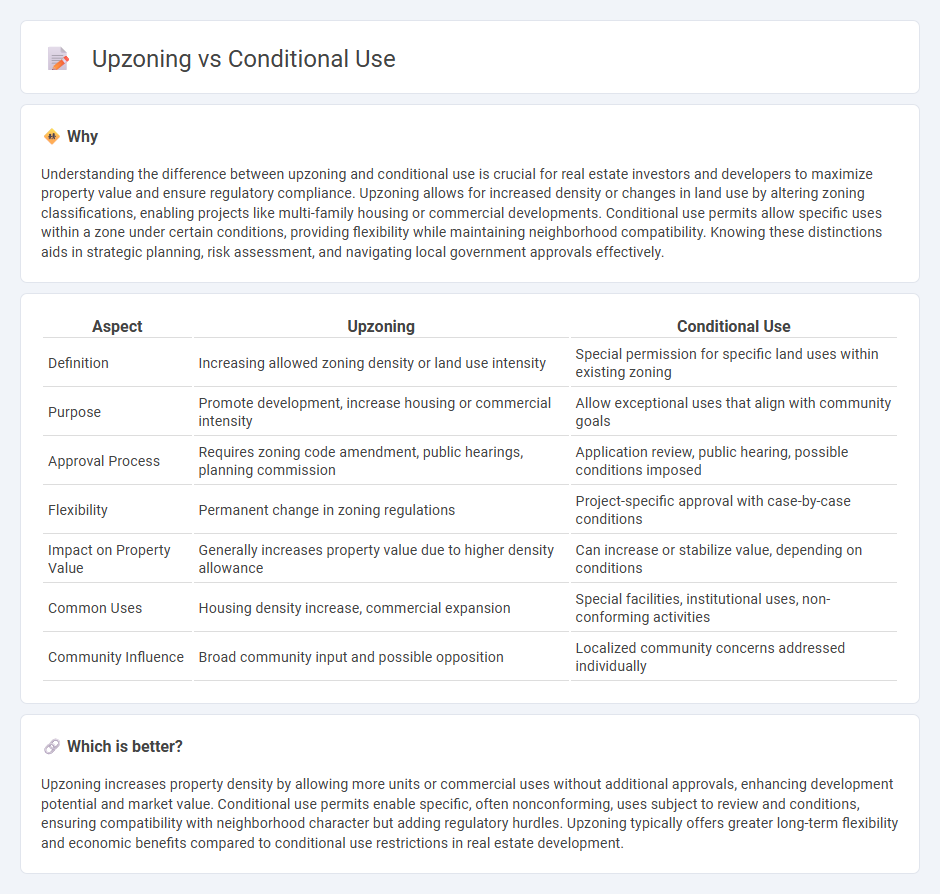
Upzoning allows increased building density or land use changes by modifying zoning laws, boosting property values and urban development opportunities. Conditional use permits grant specific exceptions within existing zoning regulations, enabling unique or temporarily permitted land uses under defined conditions. Explore the implications of upzoning versus conditional use to optimize real estate investments and development strategies.
Why it is important
Understanding the difference between upzoning and conditional use is crucial for real estate investors and developers to maximize property value and ensure regulatory compliance. Upzoning allows for increased density or changes in land use by altering zoning classifications, enabling projects like multi-family housing or commercial developments. Conditional use permits allow specific uses within a zone under certain conditions, providing flexibility while maintaining neighborhood compatibility. Knowing these distinctions aids in strategic planning, risk assessment, and navigating local government approvals effectively.
Comparison Table
| Aspect | Upzoning | Conditional Use |
|---|---|---|
| Definition | Increasing allowed zoning density or land use intensity | Special permission for specific land uses within existing zoning |
| Purpose | Promote development, increase housing or commercial intensity | Allow exceptional uses that align with community goals |
| Approval Process | Requires zoning code amendment, public hearings, planning commission | Application review, public hearing, possible conditions imposed |
| Flexibility | Permanent change in zoning regulations | Project-specific approval with case-by-case conditions |
| Impact on Property Value | Generally increases property value due to higher density allowance | Can increase or stabilize value, depending on conditions |
| Common Uses | Housing density increase, commercial expansion | Special facilities, institutional uses, non-conforming activities |
| Community Influence | Broad community input and possible opposition | Localized community concerns addressed individually |
Which is better?
Upzoning increases property density by allowing more units or commercial uses without additional approvals, enhancing development potential and market value. Conditional use permits enable specific, often nonconforming, uses subject to review and conditions, ensuring compatibility with neighborhood character but adding regulatory hurdles. Upzoning typically offers greater long-term flexibility and economic benefits compared to conditional use restrictions in real estate development.
Connection
Upzoning increases allowable building density, height, or land use intensity, creating opportunities for conditional use permits to manage specific development conditions within the new zoning framework. Conditional use permits enable property owners to apply for special exceptions that meet community standards while taking advantage of upzoning benefits. This regulatory connection balances urban growth objectives with neighborhood compatibility in real estate development.
Key Terms
Zoning Ordinance
Conditional use permits allow specific land uses that may not be generally permitted under existing zoning ordinances, subject to meeting predefined criteria and public hearings. Upzoning involves changing the zoning classification to permit higher density or more intensive land uses, often to encourage development or increase housing supply. Explore zoning ordinances further to understand how conditional use and upzoning shape urban planning strategies effectively.
Land Use Permit
Conditional use permits allow specific uses of land that are not typically permitted under current zoning laws, subject to certain conditions to mitigate potential impacts. Upzoning refers to changing the zoning designation to permit a higher density or different type of land use, often to encourage development. Explore the detailed implications of land use permits and how they influence community planning and development.
Density
Conditional use permits allow specific developments within zoning districts by imposing restrictions to control density and land use, balancing growth with community standards. Upzoning increases allowable density across broader areas by changing zoning classifications, enabling higher population and building mass without individualized review. Explore how density impacts urban planning strategies through conditional use and upzoning for a sustainable city future.
Source and External Links
THE CONDITIONAL USE PERMIT (1997) - This document discusses the legal framework of conditional use permits, including their purpose, requirements, and the conditions that must be met to avoid being deemed a taking of property.
Applying for a Variance or Conditional Use Permit in California - This webpage provides guidance on applying for a conditional use permit in California, outlining the process and necessary steps to obtain approval.
Dublin Municipal Code: Chapter 8.100 CONDITIONAL USE PERMIT - This chapter establishes procedures for conditionally approving or denying land uses that are not clearly permitted or prohibited due to their unique nature.
 dowidth.com
dowidth.com